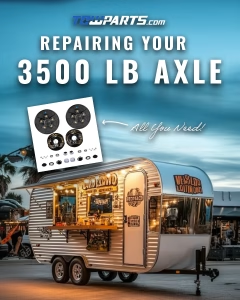
3500 lb Trailer Axle Repair: The Best All In One Kit
A well-maintained axle is the key to smooth, safe towing. If you’re noticing uneven tire
Welcome to our in-depth guide on trailer maintenance, where we’ll cover everything you need to know to keep your trailer safe, efficient, and road-ready. Whether you’re towing a small utility trailer, a large gooseneck, or anything in between, consistent trailer maintenance can make all the difference in avoiding unexpected breakdowns and costly repairs. From checking tire pressure to ensuring your brakes are in top condition, each step in your pre-trip routine helps protect both your cargo and your tow vehicle.
In this article, you’ll discover a practical checklist for your next towing adventure, learn about common trailer repair tasks, and see how reliable trailer parts and kits from TowParts.com can streamline your efforts. Plus, we’ll highlight free nationwide shipping, Axleteknologies genuine parts, and the quality service that sets TowParts.com apart. By the end of this guide, you’ll be well-prepared to hit the road with confidence.
Before we dive into the specifics, let’s discuss why trailer maintenance is so crucial. Here are a few compelling reasons:
Every trailer owner should keep a basic toolkit and essential gear on hand to simplify trailer repair and general trailer maintenance. Consider having the following:
Keeping these items in your tow vehicle or in a storage compartment on the trailer can turn a frustrating breakdown into a quick fix, ensuring your trailer maintenance tasks never catch you unprepared.
One of the best ways to stay on top of trailer maintenance is to conduct a thorough pre-trip inspection. Below is a step-by-step checklist:
Following this checklist each time you hitch up is a simple yet effective way to prevent trailer maintenance issues. Spending just 15-20 minutes can save you a world of trouble later.
A crucial component of trailer maintenance revolves around keeping your hubs, drums, and brake assemblies in top shape. When these components wear down, stopping power and overall safety can be compromised.
Your trailer’s hubs and drums endure constant stress during towing. Over time, heat, friction, and environmental factors can cause them to wear or become misaligned. Be on the lookout for:
When replacement is necessary, Trailer Hubs and Drums from TowParts.com can keep your trailer rolling smoothly. Their Axleteknologies genuine parts are designed for longevity and reliability.
Trailer brakes are critical for safe stops, especially with heavy loads. During your trailer maintenance checks, watch for:
If you need a trailer repair for your brake assemblies, TowParts.com offers a wide selection of Trailer Brakes with free nationwide shipping, making it easy to restore your brakes without breaking the bank.
Axles are the backbone of your trailer, and their condition is central to trailer maintenance. Proper axle care ensures a safer ride and fewer breakdowns.
Wheel bearings need regular lubrication to function correctly and avoid overheating. Neglected bearings are a frequent cause of roadside breakdowns and expensive trailer repair bills. Symptoms of bearing trouble include:
A fresh set of Axle Bearing Kits can fix these issues. Axleteknologies genuine parts are designed to withstand heavy loads and extreme conditions.
Sometimes, a more comprehensive overhaul is necessary. Axle Service Kits often include bearings, seals, washers, and other components tailored to specific axle models. These bundles simplify trailer maintenance, ensuring you have everything you need for a complete service. Whether you’re replacing a damaged axle or refreshing its internals, a full service kit offers long-term reliability.
Even with diligent trailer maintenance, you might encounter a few common problems. Here’s how to handle them:
Symptoms: Flickering lights, non-functional brake lamps, or inconsistent turn signals.
Solution: Check your wiring harness for frayed or exposed wires. Corrosion in the connector is another common issue. Using dielectric grease on connections can help prevent moisture buildup.
Symptoms: Sudden loss of tire pressure, difficulty controlling the trailer.
Solution: Pull over safely and replace the damaged tire. Regularly check tire pressure to reduce blowout risks, and inspect for sidewall cracks or bulges.
Symptoms: Uneven tire wear, leaning trailer, or excessive bouncing.
Solution: Inspect leaf springs and shackles. Over time, these parts can crack or wear out. Replacing them promptly is key to stable towing dynamics.
Symptoms: Difficulty attaching or detaching the trailer, excessive slack while towing.
Solution: Lubricate moving parts, and if the coupler is cracked or bent, replace it immediately. A failing hitch is a major safety hazard.
Staying aware of these frequent trailer repair issues helps maintain your trailer’s integrity. Having the right trailer parts on hand also streamlines emergency fixes.
Beyond pre-trip inspections and immediate trailer repair needs, several routine tasks will keep your trailer roadworthy for years. Incorporate these steps into your schedule to prevent sudden breakdowns and save on long-term costs.
At least twice a year—especially before towing in extreme weather—perform a comprehensive trailer maintenance review. Focus on:
Dirt, salt, and grime can accelerate rust. Washing your trailer after a trip—especially if you’ve been on salted roads or near saltwater—helps preserve the frame, hubs, and other metal parts. A light coat of wax can further protect painted surfaces.
Proper storage is crucial to successful trailer maintenance. Consider:
Keep a log of all trailer maintenance activities. Note dates for bearing servicing, tire replacements, and brake work. This makes it easier to spot patterns and schedule future services.
You now know the importance of trailer maintenance. The next step is sourcing reliable trailer parts. With so many options available, here’s why TowParts.com stands out:
Regular trailer maintenance is more than a best practice—it’s a necessity. From preventing highway hazards to saving money on surprise trailer repair bills, staying proactive pays off. Here’s a quick summary of what we covered:
Action Steps:
By following these guidelines, you greatly reduce the odds of unexpected challenges. Your rig will remain roadworthy, and each trip will be safer, smoother, and more enjoyable. After all, a well-maintained trailer is the cornerstone of any successful towing experience.
Thank you for reading, and here’s to many safe and enjoyable miles on the road with a trailer that’s always prepared to roll. For all your trailer maintenance needs—backed by free nationwide shipping and Axleteknologies genuine parts—visit TowParts.com. Stay safe, and happy towing!
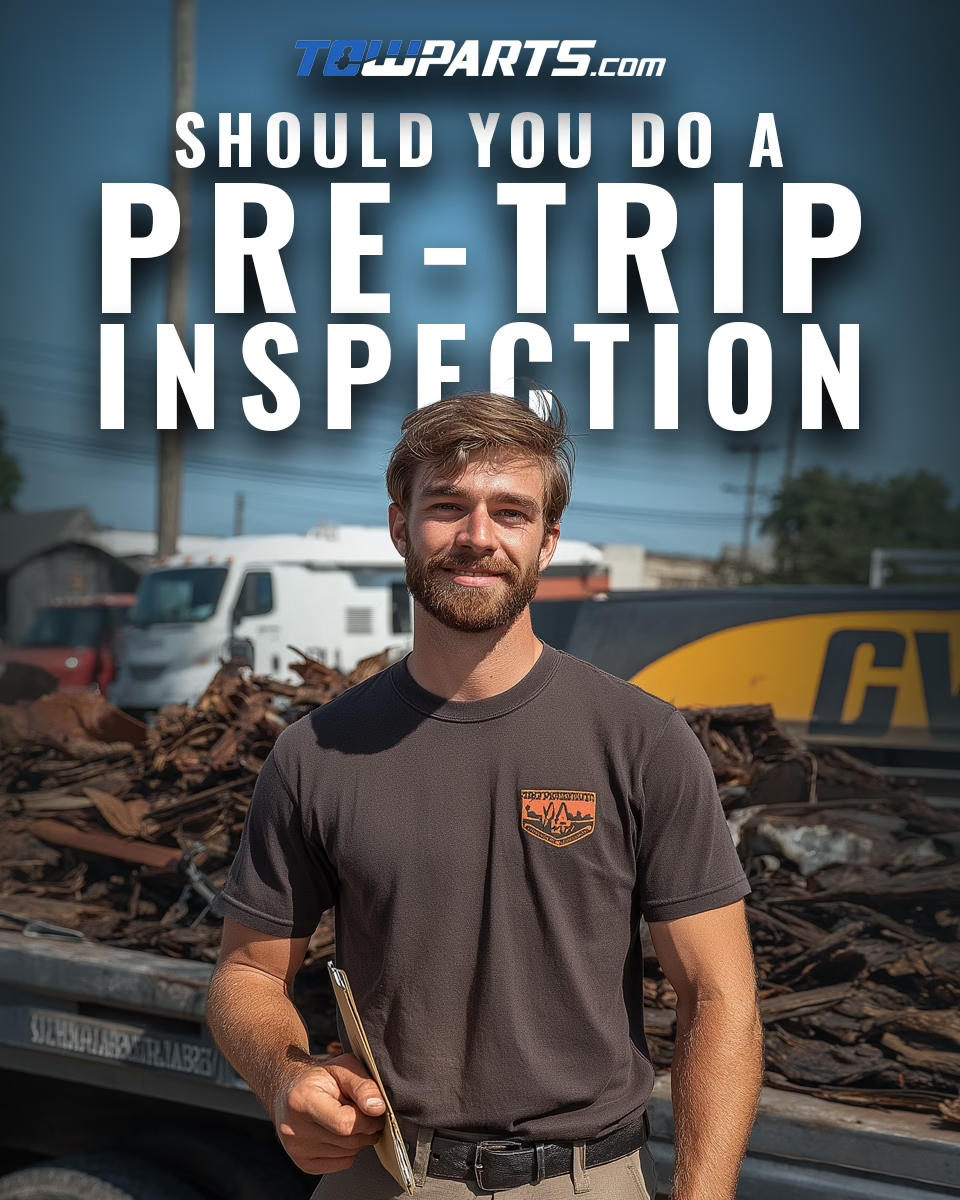

A well-maintained axle is the key to smooth, safe towing. If you’re noticing uneven tire
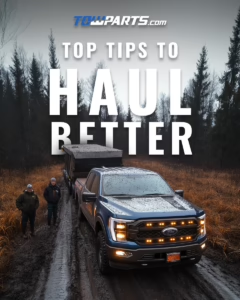
Ready to haul your trailer with more confidence and control? From proper weight distribution to
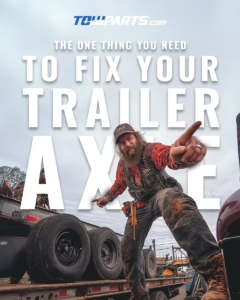
Trailer Axle Service Kits simplify maintenance by providing all the essential components—hubs, bearings, seals, races,
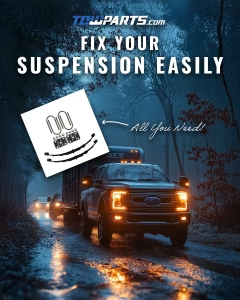
Your trailer’s suspension system does more than just absorb bumps—it ensures smooth towing, better weight
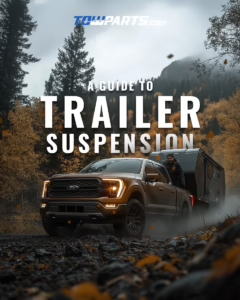
Discover how the right trailer suspension can transform your towing experience. From leaf springs to
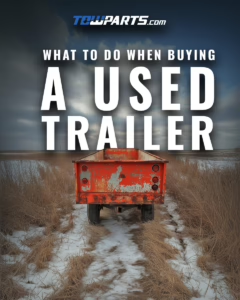
When purchasing a used trailer, it’s essential to conduct a thorough inspection to ensure all